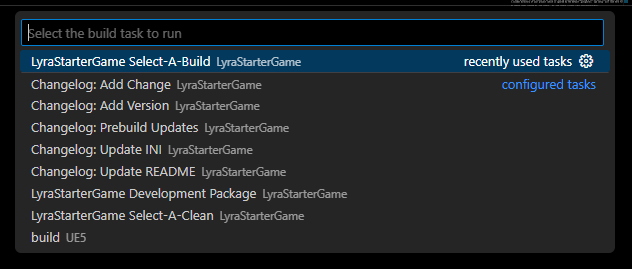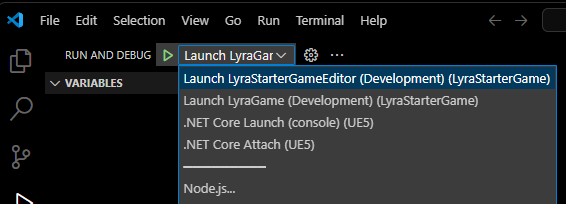
Research
PyPI Package Disguised as Instagram Growth Tool Harvests User Credentials
A deceptive PyPI package posing as an Instagram growth tool collects user credentials and sends them to third-party bot services.
unreal-project-manager
Advanced tools
A lightweight Python module for managing Unreal projects across space, time, and platforms.
A lightweight Python module for managing Unreal projects across space, time, and platforms.
Who it's for:
Less-than-professional teams working with Git and VS Code.
How to get:
pip install unreal-project-manager
git clone https://github.com/crashtestbrandt/UnrealProjectManager
Platform-aware generation of VS Code tasks to cook, build, package, and launch your Unreal 5+ project without having to open the editor (or just use the UPM CLI).
Projects can be cloned and set up for Windows, Mac, or Linux environments from a single config file with sane defaults.
Central management of project/package versioning and patch notes.
CLI commands for installing build dependencies and tools.
UPM can self-copy itelf into existing repositories so there's no need to mess with submodules or forking.
Download and install prerequisites.
Install UPM:
python3 -m pip install unreal-project-manager
Use UPM to configure your project:
python3 -m upm config --dir [project-path] --project-name [project-name]
Use UPM to install build tools.
For Windows, install Visual Studio Community with python3 -m upm install-vs. This will prompt for privilege escalation.
For MacOS, install XCode with python3 -m upm install-xcode (STILL TESTING)
Additionally, if you don't have VS Code installed, you can do:
python3 -m upm install-vscode
Navigate to your project directory and use UPM to perform project setup and generate project files:
python3 -m upm setup
With your new .code-workspace file open in VS Code, use Ctrl+Shift+B to open the build menu and build your project.
To fully cook, build, and package a development version of your project, choose the Development Package option. This is required before launching the Development configuration for your game from the Run and Debug menu (Ctrl+Shift+D), as building and launching a Development target directly will result in shaders not being compiled.
To work on your project in the editor, first select the Select-A-Build option from the build menu, selecting the Development and Editor options when prompted.
Once your chosen target is built, navigate to the Run and Debug menu (Ctrl+Shift+D), select the target to launch from the dropdown menu, and click Start Debugging (green arrow). If this is your first time launching the Editor for your project, be prepared for it to hang a while as it compiles shaders.
Adds scripts and configuration files to your project you'll probably want to keep under source control for use by collaborators.
NOTE: Here we're using Epic's Lyra Starter Game sample as an example project.
Install UPM:
python3 -m pip install unreal-project-manager
Use UPM to copy configuration files into your project directory:
python3 -m upm config --dir ../LyraStarterGame
This creates several items in your target directory:
config.upm: Contains UPM project configuration values upm setup uses to generate UPM project files and VS Code tasks.
Changelog.json: Used by upm changelog to centralize patch notes (initialized with version 0.0.0-Alpha; modify this as you see fit).
upm/: Directory containing UPM scripts used by generated VS Code tasks for build/cook/launch/package/deploy/change automation.
.gitignore: Default .gitignore file for use with Unreal 5+, C++, Python 3.10+, and UPM. Omit this argument if you already have a suitable .gitignore file in the target directory.
If config.upm already exists in your project directory, UPM won't overwrite it. This allows you to keep a default config.upm under version control for your project. If you choose to do this but end up occasionally requiring a non-default config.upm, you can copy you custom config.upm into the .vscode directory of your project (which is ignored by the default .gitignore); upm setup will look here first for a config file.
To remove items created by upm config, do upm config --clean --dir your-project-dir/.
Do upm config -h to see options for modifying the default behavior of upm config, e.g. changing the default location of Unreal Engine or specifying a project name different from the project directory.
Generates files required for project automation, including Python dependencies (installed to .venv by default), environment variables (.env by default), VS Code workspace configuration files, build/launch tasks, and Unreal project files. These are all excluded via the default .gitignore file added by upm config.
To set up your project with UPM:
Ensure you've configured it using upm config as discussed in previous sections.
Ensure build tools are installed for your platform, e.g. by doing python3 -m upm install-vs.
Navigate to your project directory and do:
python3 -m upm setup
The files and directories generated by upm setup are not intended to be placed under source control. When sharing your project for collaboration, you should include instructions for generating them with UPM.
You can remove UPM files generated by upm setup with upm setup --clean; this does not remove Unreal project files or the .code-workspace file.
UPM adds several platform-specific tasks to .vscode/launch.json and .vscode/tasks.json, which are wrappers for the various upm build commands:


usage: upm build [-h] --project-dir PROJECT_DIR --build-type BUILD_TYPE --target-name TARGET_NAME [--clean] [--build] [--package]
options:
-h, --help show this help message and exit
--project-dir PROJECT_DIR
Path to the project directory
--build-type BUILD_TYPE
Type of build (debug, development, testing. release)
--target-name TARGET_NAME
Name of target to build.
--clean Clean selected targets
--build Build selected targets
--package Package selected target for deployment
You can access the launch configurations from the Run and Debug menu (Ctrl+Shift+D) and the build tasks from the Build menu (Ctrl+Shift+B). You must build a target before launching it, i.e. use Select-A-Build from the Build menu before launching from the Run and Debug menu.
Initialize Changelog / Increment Version
To create a changelog file (Changelog.json) with an initial version (0.0.1), you can either:
upm changelog --add-versionThese same two commands can be used to increment the current version.
Add change
Add a change to the current version with either of the following:
Update DefaultGame.ini
Update the version in your project's DefaultGame.ini file with either:
upm changelog --update-iniFor all options, do upm changelog -h.
Windows
To initiate Python 3 installation on Windows, open Powershell and do:
python3
This opens the Microsoft Store and prompts you install Python 3.12.
Download and install the latest release of Unreal Engine 5.4 through the Epic Games Launcher.
Unreal Engine -> Library -> Engine Versions -> Add (+)
Launch Unreal Engine 5.4. Select Fix if prompted to correct file associations.
...
FAQs
A lightweight Python module for managing Unreal projects across space, time, and platforms.
We found that unreal-project-manager demonstrated a healthy version release cadence and project activity because the last version was released less than a year ago. It has 1 open source maintainer collaborating on the project.
Did you know?

Socket for GitHub automatically highlights issues in each pull request and monitors the health of all your open source dependencies. Discover the contents of your packages and block harmful activity before you install or update your dependencies.

Research
A deceptive PyPI package posing as an Instagram growth tool collects user credentials and sends them to third-party bot services.

Product
Socket now supports pylock.toml, enabling secure, reproducible Python builds with advanced scanning and full alignment with PEP 751's new standard.

Security News
Research
Socket uncovered two npm packages that register hidden HTTP endpoints to delete all files on command.